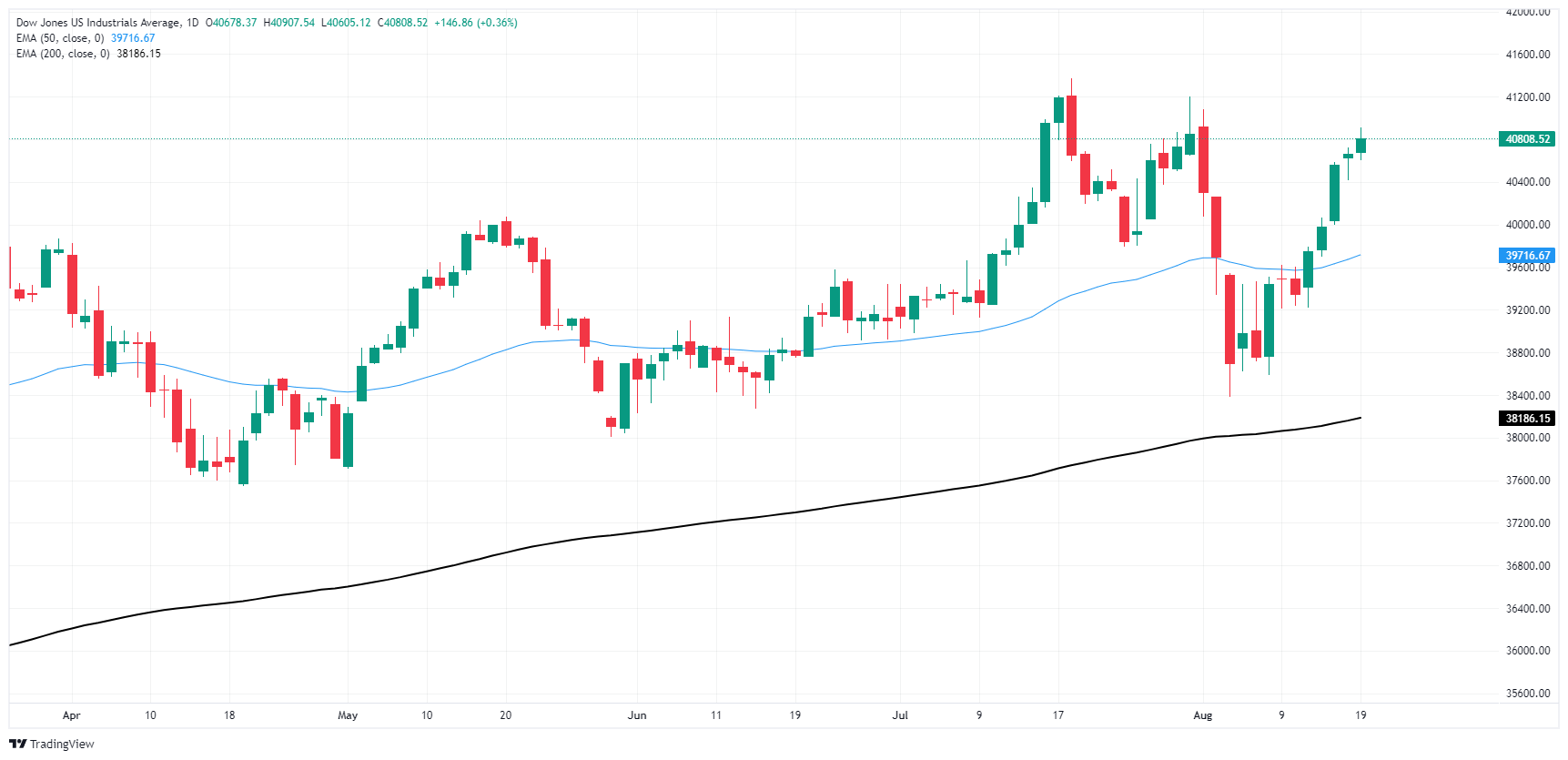- Analytics
- News and Tools
- Market News
- Dow Jones Industrial Average extends recovery rally on Monday
Dow Jones Industrial Average extends recovery rally on Monday
- The Dow Jones Industrial Average rose over 150 points in Monday bid.
- Equities continue to recover ground as market sentiment climbs.
- Previous recession fears have eased following upbeat US data.
The Dow Jones Industrial Average (DJIA) climbed over 150 points in quiet trading on Monday as US market indexes broadly gain ground. Investors have rediscovered their risk appetite after a recent broad-based plunge sparked by fresh recession fears off the back of US economic data tilting to the downside faster than many had expected. However, an upturn at the tail end of a recent batch of US figures has soothed investor fears, and markets are broadly climbing once more.
Markets will now pivot to fully focus on upcoming central bank speaking notes as the Jackson Hole Economic Symposium looms ahead later in the week. At the current cut, markets still have a September rate cut fully priced in, according to the CME’s FedWatch Tool. Odds of a double cut for 50 bps have eased to less than 25% this week, down from a two-week high of over 70%, with rate traders piling into bets of a more reasonable 25 bps cut on September 18.
Dow Jones news
Most of the Dow Jones is on the rise on Monday, with over two-thirds of the equity board climbing into the green. McDonald’s Corp. (MCD) is gaining ground, climbing 3.4% to $288.00 per share. Intel Corp. (INTC) followed behind, rising 2.5% to $21.39 per share.
On the low end, Boeing Corp. (BA) fell a full percent to $178.15 per share as the aviation company struggles to return value to investors, with Apple Inc. (AAPL) declining -0.7% to $224.50 per share.
Dow Jones price forecast
The Dow Jones is on pace to chalk in a fifth straight bullish candle on Monday, tapping an intraday high of 40,907.54 as the major equity index continues to climb after hitting a near-term low of 38,382.90 in recent weeks.
The DJIA is slowly grinding its way back towards all-time highs set in July at 31,371.38, and bullish momentum remains the flavor of the week as investors claw back ground. A technical floor is priced in at the 50-day Exponential Moving Average (EMA) at 39,728.00.
Dow Jones daily chart
Dow Jones FAQs
The Dow Jones Industrial Average, one of the oldest stock market indices in the world, is compiled of the 30 most traded stocks in the US. The index is price-weighted rather than weighted by capitalization. It is calculated by summing the prices of the constituent stocks and dividing them by a factor, currently 0.152. The index was founded by Charles Dow, who also founded the Wall Street Journal. In later years it has been criticized for not being broadly representative enough because it only tracks 30 conglomerates, unlike broader indices such as the S&P 500.
Many different factors drive the Dow Jones Industrial Average (DJIA). The aggregate performance of the component companies revealed in quarterly company earnings reports is the main one. US and global macroeconomic data also contributes as it impacts on investor sentiment. The level of interest rates, set by the Federal Reserve (Fed), also influences the DJIA as it affects the cost of credit, on which many corporations are heavily reliant. Therefore, inflation can be a major driver as well as other metrics which impact the Fed decisions.
Dow Theory is a method for identifying the primary trend of the stock market developed by Charles Dow. A key step is to compare the direction of the Dow Jones Industrial Average (DJIA) and the Dow Jones Transportation Average (DJTA) and only follow trends where both are moving in the same direction. Volume is a confirmatory criteria. The theory uses elements of peak and trough analysis. Dow’s theory posits three trend phases: accumulation, when smart money starts buying or selling; public participation, when the wider public joins in; and distribution, when the smart money exits.
There are a number of ways to trade the DJIA. One is to use ETFs which allow investors to trade the DJIA as a single security, rather than having to buy shares in all 30 constituent companies. A leading example is the SPDR Dow Jones Industrial Average ETF (DIA). DJIA futures contracts enable traders to speculate on the future value of the index and Options provide the right, but not the obligation, to buy or sell the index at a predetermined price in the future. Mutual funds enable investors to buy a share of a diversified portfolio of DJIA stocks thus providing exposure to the overall index.
© 2000-2026. All rights reserved.
This site is managed by Teletrade D.J. LLC 2351 LLC 2022 (Euro House, Richmond Hill Road, Kingstown, VC0100, St. Vincent and the Grenadines).
The information on this website is for informational purposes only and does not constitute any investment advice.
The company does not serve or provide services to customers who are residents of the US, Canada, Iran, The Democratic People's Republic of Korea, Yemen and FATF blacklisted countries.
Making transactions on financial markets with marginal financial instruments opens up wide possibilities and allows investors who are willing to take risks to earn high profits, carrying a potentially high risk of losses at the same time. Therefore you should responsibly approach the issue of choosing the appropriate investment strategy, taking the available resources into account, before starting trading.
Use of the information: full or partial use of materials from this website must always be referenced to TeleTrade as the source of information. Use of the materials on the Internet must be accompanied by a hyperlink to teletrade.org. Automatic import of materials and information from this website is prohibited.
Please contact our PR department if you have any questions or need assistance at pr@teletrade.global.















